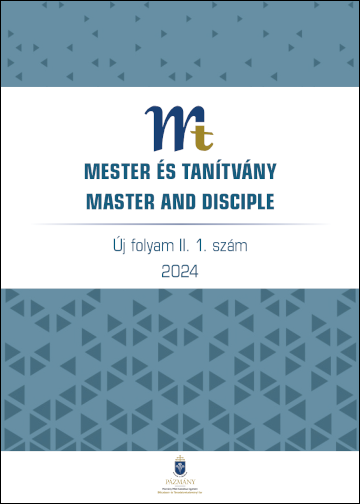Developing learners’ intercultural communicative competence using thinking routines in inquiry-based English language teaching
Published 11-07-2024
Keywords
- intercultural communicative competence,
- thinking routines,
- metacognitive awareness,
- inquiry-based English language teaching
Copyright (c) 2024 Mongyi Norbert

This work is licensed under a Creative Commons Attribution 4.0 International License.
Abstract
The paper explores the development of the intercultural communicative competence (ICC) of high-school learners of English as a foreign language through the implementation of thinking routines within an inquiry-based language teaching framework. Emphasizing the importance of ICC, the paper begins by situating this competence within the Hungarian National Core Curriculum. The inquiry-based language teaching approach is then examined, highlighting its alignment with the needs of teaching English as a foreign language in an information-based society and its efficacy in promoting active English language learning. The paper introduces thinking routines as strategic tools that teachers can employ to scaffold learners’ thinking and enhance their metacognitive awareness. Subsequently, three thinking routines are presented as implemented during English lessons in a Hungarian high school. The paper argues that such an approach not only improves linguistic proficiency but also equips learners with the intercultural communicative competence necessary for meaningful engagement in our globalized, information-based society.
References
- Bárdos, J. (2004). Kulturális kompetencia az idegen nyelvek tanításában. In Bárdos, J. (Ed.), Nyelvpedagógiai tanulmányok (pp. 142-157). Pécs: Iskolakultúra.
- Barrett, M., Byram, M., Lázár, I., Mompoint-Gaillard, P., & Philippou, S. (2014). Developing intercultural competence through education. Pestalozzi Series No. 3. Strasbourg: Council of Europe.
- Beneke, J. (2000). Intercultural competence. In U. Bliesener (Ed.), Training the trainers. International business communication. Vol. 5 (pp.108-109). Köln: Carl Duisberg Verlag.
- Cope, W., & Kalantzis, M. (2010). Ubiquitous learning: An agenda for educational transformation. In B. Cope, & M. Kalantzis (Eds.), Ubiquitous Learning (pp. 1-14). University of Illinois Press.
- Dörnyei, Z. (2010). Researching motivation: from integrativeness to the ideal L2 self. In S. Hunston & D. Oakey (Eds.), Introducing applied linguistics: concepts and skills. London; New York: Routledge.
- Farczádi Bencze, T., Jakus, E., Kránicz, E., Öveges, E. & Perge, G. (2020). Útmutató az idegen nyelv tantárgy tanításához a 2020-ban kiadott Nemzeti alaptanterv és kerettantervek alapján. Eger. Oktatás 2030 Tanulástudományi Kutatócsoport.
- Hedge, T. (2003). Writing. Oxford University Press. New York.
- Holló, D. (2019). Kultúra és interkulturalitás a nyelvórán. Budapest. KRE. L’Harmattan Kiadó.
- Ismael, N. & Elias, S. (2006). Inquiry-based learning: A new approach to classroom learning. English Language Journal, 2(1), 13-22.
- Kimmel, M. (2020). Culture Teaching in the Age of Global English. In Károly, K., Lázár, I. & Gall, C. (Ed.), Culture and Intercultural Communication: Research and Education (pp. 11-29). Budapest: ELTE School of English and American Studies.
- Lee, V. S., Greene, D. B., Odom, J., Schechter, E., & Slatta, R. W. (2004). What is inquiry-guided learning. In V. S. Lee (Ed.), Teaching and learning through inquiry: A guidebook for institutions and instructors (pp. 3-15). VA: Stylus Publishing. Sterling.
- Mackenzie, T. (2016). Dive into inquiry: Amplify learning and empower student voice. California: EdTechTeam Press.
- Mitchell, H. Q., & Malkogianni, M. (2015). Pioneer Intermediate B1 Student’s book. MM Publications.
- Mitchell, H. Q., & Malkogianni, M. (2015). Pioneer B2 Student’s book. MM Publications.
- Ritchhart, R. (2023). Cultures of Thinking in Action: 10 Mindsets to Transform our Teaching and Students’ Learning. John Wiley & Sons.
- Ritchhart, R., & Perkins, D. (2008). Making Thinking Visible. Educational Leadership, 65(2), 57-61.
- Ritchhart, R., Church, M., & Morrison, K. (2011). Making thinking visible: How to promote engagement, understanding, and independence for all learners. John Wiley & Sons.
- Soars, L., Soars. J. & Hancock, P. (2019). Headway Advanced Student’s Book (5th ed.). Oxford: Oxford University Press.
- van Lier, L. (2004). The Ecology and Semiotics of Language Learning: A Sociocultural Perspective. Dordrecht: Kluwer Academic Publishers.


